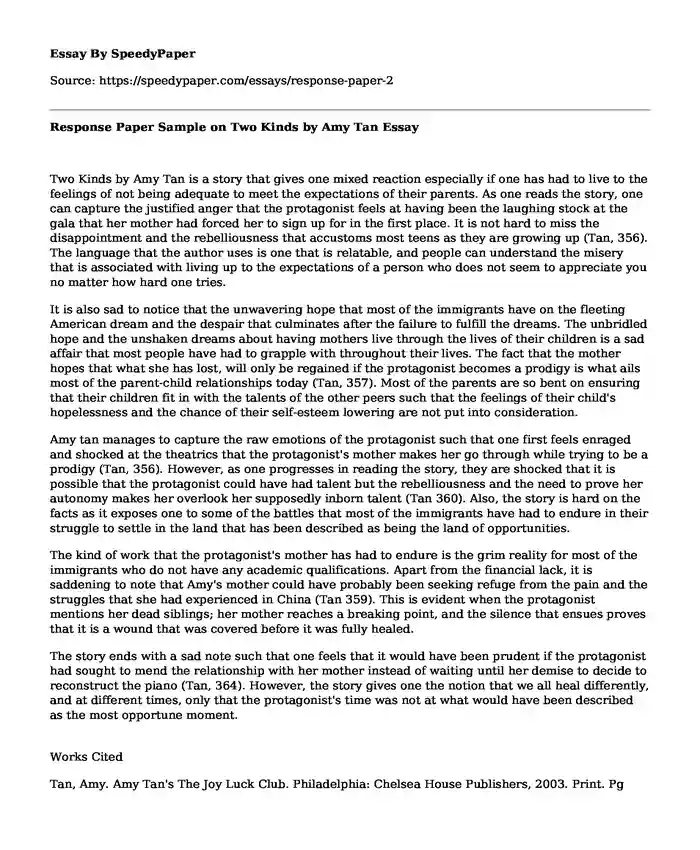
| Essay type: | Response essays |
| Categories: | Amy Tan |
| Pages: | 3 |
| Wordcount: | 581 words |
Two Kinds by Amy Tan is a story that gives one mixed reaction especially if one has had to live to the feelings of not being adequate to meet the expectations of their parents. As one reads the story, one can capture the justified anger that the protagonist feels at having been the laughing stock at the gala that her mother had forced her to sign up for in the first place. It is not hard to miss the disappointment and the rebelliousness that accustoms most teens as they are growing up (Tan, 356). The language that the author uses is one that is relatable, and people can understand the misery that is associated with living up to the expectations of a person who does not seem to appreciate you no matter how hard one tries.
It is also sad to notice that the unwavering hope that most of the immigrants have on the fleeting American dream and the despair that culminates after the failure to fulfill the dreams. The unbridled hope and the unshaken dreams about having mothers live through the lives of their children is a sad affair that most people have had to grapple with throughout their lives. The fact that the mother hopes that what she has lost, will only be regained if the protagonist becomes a prodigy is what ails most of the parent-child relationships today (Tan, 357). Most of the parents are so bent on ensuring that their children fit in with the talents of the other peers such that the feelings of their child's hopelessness and the chance of their self-esteem lowering are not put into consideration.
Amy tan manages to capture the raw emotions of the protagonist such that one first feels enraged and shocked at the theatrics that the protagonist's mother makes her go through while trying to be a prodigy (Tan, 356). However, as one progresses in reading the story, they are shocked that it is possible that the protagonist could have had talent but the rebelliousness and the need to prove her autonomy makes her overlook her supposedly inborn talent (Tan 360). Also, the story is hard on the facts as it exposes one to some of the battles that most of the immigrants have had to endure in their struggle to settle in the land that has been described as being the land of opportunities.
The kind of work that the protagonist's mother has had to endure is the grim reality for most of the immigrants who do not have any academic qualifications. Apart from the financial lack, it is saddening to note that Amy's mother could have probably been seeking refuge from the pain and the struggles that she had experienced in China (Tan 359). This is evident when the protagonist mentions her dead siblings; her mother reaches a breaking point, and the silence that ensues proves that it is a wound that was covered before it was fully healed.
The story ends with a sad note such that one feels that it would have been prudent if the protagonist had sought to mend the relationship with her mother instead of waiting until her demise to decide to reconstruct the piano (Tan, 364). However, the story gives one the notion that we all heal differently, and at different times, only that the protagonist's time was not at what would have been described as the most opportune moment.
Works Cited
Tan, Amy. Amy Tan's The Joy Luck Club. Philadelphia: Chelsea House Publishers, 2003. Print. Pg 356- 364
Cite this page
Response Paper Sample on Two Kinds by Amy Tan. (2022, Feb 21). Retrieved from https://speedypaper.net/essays/response-paper-2
Request Removal
If you are the original author of this essay and no longer wish to have it published on the SpeedyPaper website, please click below to request its removal:
- Love Without Boundaries - Essay Samples for You to Choose From
- Russian Revolution Essay Sample
- Medicare Essay Sample
- My Initial Reaction in Finding Out My Top Five Strengths
- Resistance to Civil Government by Henry David Thoreau - Essay Example
- Essay Sample on How NFL Protests Were Covered by Various Media
- Applicability of Self-determination Principle in Catalonia
Popular categories




